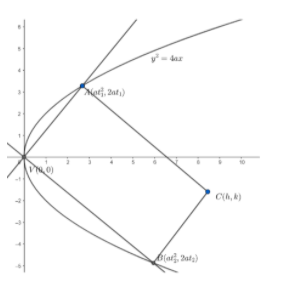Question
Question: If from the vertex of a parabola, a pair of chords be drawn at right angles to one another and with ...
If from the vertex of a parabola, a pair of chords be drawn at right angles to one another and with these chords as adjacent sides a rectangle be made, prove that the locus of the further angle of the rectangle is the parabola y2=4a(x−8a).
Solution
Hint: The mid-points of the diagonals of a rectangle are the same .
Let’s take the equation of parabola as y2=4ax.
We know the vertex of this parabola is at V(0,0).
Let A(at12,2at1) and B(at22,2at2) be the two vertices of the rectangle.

Now, we are given that the two chords are perpendicular.
We know that if two lines are perpendicular to each other , then the product of their slopes is equal to −1.
So, slope of VA× slope of VB=−1
Now , we will find the slope of VA and slope of VB.
We know , the slope of the line joining two points (x1,y1) and (x2,y2) is given as m=x2−x1y2−y1.
So , slope of VA=at12−02at1−0=t12
And , slope of VB=at22−02at2−0=t22
So, t12×t22=−1
⇒t1t2=−4....(i)
We need to find the locus of further vertex.
So , we will consider the further vertex to be C(h,k).
Now , in the question it is given that AVBC is a rectangle.
We know the diagonals of a rectangle bisect each other.
So , midpoint of AB= midpoint of VC.....(ii)
Now, we will find the midpoints of AB and VC.
Midpoint of
AB=(2at12+at22,22at1+2at2)
=(2at12+at22,at1+at2)....(iii)
Midpoint of VC=(2h+0,2k+0)
=(2h,2k).....(iv)
From (ii),(iii)and (iv), we can say
2h=2at12+at22 and 2k=at1+at2
Now, 2h=2at12+at22
⇒t12+t22=ah....(v)
and 2k=(at1+at2)
⇒t1+t2=2ak.....(vi)
Squaring both sides we get
t12+t22+2t1t2=4a2k2.....(vii)
From equation (i),(v)and (vii)
ah−8=4a2k2
or k2=4a(h−8a)…….equation(viii)
Now, to find the locus of C(h,k), we will substitute (x,y) in place of (h,k) in equation (viii)
So, the locus of C(h,k) is given as y2=4a(x−8a)
Note: While simplifying the equations , please make sure that sign mistakes do not occur. These mistakes are very common and can cause confusions while solving. Ultimately the answer becomes wrong. So, sign conventions should be carefully taken .
